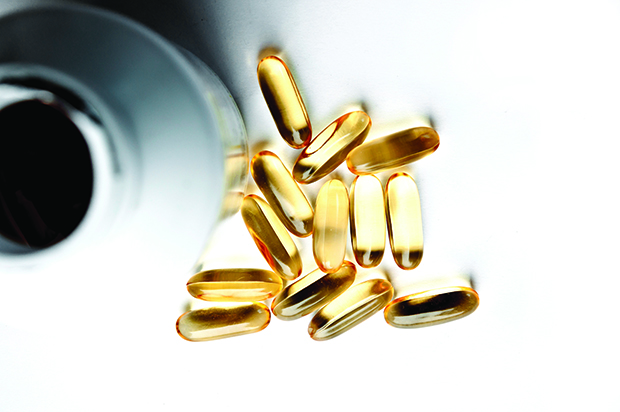


With its myriad of health benefits, it’s no wonder that fish oil supplements seem to receive more and more praise every year. These little gel caps have become a foundational supplement, something that every person should be taking, whether they’re competing on a stage, in a race, or simply competing in life. Not only are they good for your heart, but they have some other aesthetically pleasing benefits that you may not have known about.
Fish oil supplements contain the omega-3 fatty acids eicosapentaenoic acid (EPA) and docosahexaenoic acid (DHA). These two polyunsaturated fatty acids are found in fish, especially shellfish, salmon, sardines, and mackerel. Non-fish eaters can consume certain vegetables that contain a linoleic acid, which converts (albeit, not very efficiently) to EPA and DHA upon digestion. Since the typical Western diet falls short of reaching the recommended amounts of EPA and DHA—and that deficit can become even greater for those following a vegetarian/vegan diet—supplementation is recommended and practically required for anyone who is serious about their health and physique.
Muscle Hypertrophy
Now I’ll admit when I heard about this, even I was somewhat skeptical. We all know about how great fish oil is for your cardiovascular system, but good for muscle fibers? Well, believe it or not, omega-3 fatty acid supplementation has been linked to increasing protein synthesis. In fact, just a few years ago a first-of-its-kind clinical trial was performed to determine if and how fish oils increased protein synthesis.
To be fair, the study was done on older adults, but the results are still meaningful. The omega-3 fish oil supplementation stimulated muscle protein synthesis. The researchers believe that is was due to an increase in mTOR and p70s6k. These two proteins are very important in the process of building muscle. Essentially, you want mTOR, and you want a lot of it to be active because when mTOR is working, it upregulates protein synthesis. And since p70s6k is a downstream target in the same process, you want that to be abundant as well. The results of the clinical trial were confirmed by several other studies that determined there was an increase in mTOR and p70s6k activity as a result of fish oil supplementation.
Now the recommendation is a minimum of 250 milligrams of EPA/DHA per day. However, the studies that resulted in greater protein synthesis used approximately 3.5 grams of EPA/DHA per day. If you’re looking to build some muscle, I would stick to 3.5 to four grams each day for about at least eight weeks.

Fat Loss
It turns out that fat loss is another benefit of fish oil supplementation. The research has returned mixed results, but that is a product of different dosing amounts. In general, it has been found that fish oil supplementation does aid in decreasing body fat, but you have to consume well above the recommended amount in order to reap the benefits.
Studies have shown that fish oil supplementation of approximately two grams per day results in reduced body fat, regardless of exercise status. Other studies have also shown that 2.5 grams per day of fish oil supplementation decreased fat mass and body-fat percentage after just six weeks. The question is, how does it work?
Scientists are actually unclear as to the exact mechanism that leads to fat loss, but there are several theories out there. The main theory appears to be the role that omega-3 fatty acids have in upregulating beta-oxidation. Beta-oxidation is the process that is responsible for lipoly-sis. It is believed that the omega-3s increase the expression of certain genes that are responsible for the enzymes in beta-oxidation. Greater expression means that there are a greater number of enzymes that participate in beta-oxidation. And that leads to greater fat loss.
Something’s Fishy
The effects of fish oil supplementation on performance have been a bit of a disappointment. Several studies have investigated the effects of fish oil on aerobic and anaerobic performance and have determined that fish oils did not bolster athletic improvement. These studies covered a variety of sports from cyclists to soccer players and rugby players, and none saw any significant improvement.
Another idea that has been circulating lately is the effect that fish oils may have on testosterone. It is thought that fish oil supplementation increases testosterone production. The research has shown that fish oil consumption alters the testicular concentration of testosterone in adult pigs and in cell models, but research done on humans has not produced the same results. Ultimately, more research is needed in this area to clarify the effects of fish oil supplementation on testosterone before we can make solid conclusions about its effectiveness.
One thing that may catch your attention is the idea that fish oil supplementation is also known as fat supplementation. Just the name can make you cringe if you are in a dieting phase. Thankfully, even the fat-phobic don’t have to worry about getting flabby from fish oil. Why? Well, we already know that fish oil supplementation results in fat loss, possibly through increased fat oxidation. This has been shown to also occur when there are increases in dietary fat, simply meaning that the more fat you consume, the more fat you are likely to burn. Therefore, even if you’re taking higher doses of fish oil (greater than five grams per day), you do not need to restrict your dietary fat intake to accommodate the fish oil supplements.
Recommendations
How much you take is going to be similar for muscle hypertrophy and fat loss. Most studies used at least two grams of EPA/DHA per day, so that should be a good starting point. Take that dose for a few weeks and reassess your progress. If you’re comfortable increasing the dosage, do so. Try not to go over about 5.5 grams per day. It is possible that you may get some GI discomfort at intakes greater than that. But you shouldn’t have to worry about mercury intake since these supplements are held to different standards compared with whole fish. Make sure you’re reading your labels to determine your actual EPA/DHA content, which will be less than the content of total fish oil. Most likely the manufacturer’s recommended dose will be less than what you need for your desired results.
By Jenevieve Roper, PHD, CSCS






















You must be logged in to post a comment Login